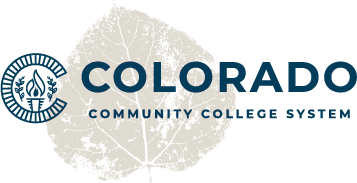State Board | Policies and Procedures
SP 9-30a – Associate Degrees
COLORADO COMMUNITY COLLEGE SYSTEM
SYSTEM PROCEDURE
Associate Degrees
SP 9-30a
APPROVED: December 8, 1988
EFFECTIVE: Beginning of school year 1989-90
REVISED: July 13, 1995
REVISED: December 9, 1999
REPEALED: September 14, 2000
READOPTED: August 25, 2001
REVISED: December 8, 2004
REVISED: March 11, 2020
REVISED: July 13, 2021
REFERENCE(S): Board Policy (BP) 9-30, Approval of Academic Programs; CRS 23-60-202(1)(f)
APPROVED:
/ Joseph A. Garcia /
Joseph A. Garcia, Chancellor
Application
This procedure applies to all associate degree programs approved by the Board pursuant to Board Policy (BP) 9-30 Approval of Academic Programs. An associate degree program reflects the larger goals of educational attainment the institution holds for its students. The associate degree indicates that the holder has developed proficiencies sufficient to prepare for upper-division collegiate work, or to enter directly into a specific occupation or to meet individual career goals. An associate degree is awarded only for completion of a coherent program of study designed for a specific purpose. This procedure defines the associate degrees, program designations, and minimum standards as they have been approved by the State Board for Community Colleges and Occupational Education (SBCCOE).
Degrees with Designation
Degrees with designation are those associate degrees that have been approved by the Colorado Department of Higher Education (CDHE) for statewide guaranteed transfer to four-year institutions. CCCS offers the following degrees with designation:
Associate of Arts Degree (A.A.)
A two-year academic degree designed to transfer to a four-year degree program, limited to 60 credits.
- An Associate of Arts without designation is designed to transfer into liberal arts and related degree programs.
- An Associate of Arts degree with a program designation is designed to transfer into a specific four-year program aligned with a Statewide Articulation Agreement.
Associate of Science Degree (A.S.)
A two-year academic degree designed to transfer to a four-year degree program, limited to 60 credits.
- An Associate of Science without designation is designed to transfer into math, science and related degree programs.
- An Associate of Science degree with a program designation is designed to transfer into a specific four-year program aligned with a Statewide Articulation Agreement.
Other Associate Degrees
The Board has approved the following associate degrees that are not designated for statewide guaranteed transfer by CDHE, but may be fully or partially transferable through individual agreements with four-year institutions.
Associate of Engineering Science Degree (A.E.S.)
A two-year academic degree designed to transfer to a four-year engineering degree program. Each A.E.S. agreement with a four-year university or university system is designed to meet the needs of the individual university or university system engineering program.
Associate of Fine Arts Degree (A.F.A.)
A two-year academic degree designed to transfer to a four-year degree program. An Associate of Fine Arts degree with a program concentration is designed to transfer into a specific four-year Bachelor of Fine Arts program.
Associate of General Studies Degree (A.G.S.)
There are two types of A.G.S. degrees:
- This first type of A.G.S. degree is designed to meet individual career goals with no intent of transferring to baccalaureate degree programs. It consists of a broad program of both career and traditional transfer courses without the constraints of specialization. Transferability of this customized degree program depends upon the courses taken and the receiving institution. The A.G.S. degree is limited to 60 credits and requires at least 30 semester hours of general education. Fifteen (15) of these semester hours must be in prescribed general education courses labeled as those accepted in the State Guaranteed General Education Transfer and designated as such in the college catalog.
- The second type of the A.G.S. degree is used as a technical transfer degree with a major field specified, and is designed for students to transfer into a baccalaureate degree program with junior standing, based on a written articulation agreement with one or more designated institutions. The course of study for the various fields of specialization must be outlined in the college catalog as well as the identification of the baccalaureate institution(s) that have agreed to accept the program in transfer. The A.G.S. degree is limited to 60 credits and requires at least 30 semester hours of general education. The other hours will be subject to the terms of the agreement with the baccalaureate institution(s).
Associate of Applied Science Degree (A.A.S.)
This degree (with the occupational field specified) is intended to prepare individuals to enter skilled and/or paraprofessional occupations or to upgrade/stabilize their employment. These programs may not be intended for transfer to baccalaureate degree programs or may be designed to transfer to a corresponding bachelor degree. The range of semester credit hours is 60 (minimum) to 75 (maximum). Exceptions to the A.A.S. degree maximum of 75 semester credit hours may be granted in those fields which demonstrate need that requires additional course work. The general education component of the A.A.S. is 15 semester credit hours. The general education and occupational content must be consistent with the role and mission of the College.
Other Academic Associate Degrees
Colleges may establish, with the approval of the Vice Chancellor for Academic and Student Affairs, other two-year academic degrees that are not designated for guaranteed statewide transfer, but may be designed to transfer to a four-year degree program through individual agreements.
General Education Requirements
Definition of General Education — General education is ‘general’ in several clearly identifiable ways: It is not directly related to a student’s formal, technical, vocational, or professional preparation; it is a part of every student’s course of study, regardless of the student’s area of emphasis; and it is intended to impart common knowledge, intellectual concepts, and attitudes which every educated person should possess. The Vice Chancellor for Academic and Student Affairs shall develop a process for the development of, changes to, and exceptions to the General Education Core Curriculum for both the A.A. and A.S. degrees. All CCCS Colleges must include the General Education Core Curriculum into each A.A. and A.S. degree.
Transcripts
For all associate degrees, the transcript of a student should reveal the exact nature of the program completed. A grade of “C” or better is required in each course applied to the degree in order to be accepted for guaranteed transfer as described in the Colorado Commission on Higher Education (CCHE) Transfer Policy.
State Guaranteed Transfer Courses
The State Guaranteed General Education Transfer Courses (GT Pathways) are designated by CCHE as those whose transfer to Colorado public higher education institutions is guaranteed. The Community College core includes at least the appropriate courses and their distribution to meet the State Guarantee program. The Community College core will fulfill lower-division general education requirements for the Associate of Arts and the Associate of Science degrees at all community/junior colleges in Colorado. When the required general education courses have been completed satisfactorily, they fulfill the lower-division general education requirements of most liberal arts and sciences baccalaureates in Colorado public higher education institutions as described in the CCHE Transfer Policy. Once a student has been certified by a community college on the official transcript as having completed satisfactorily its general education core curriculum, regardless of whether the associate degree is conferred, no other state university or community/junior college to which the student may transfer shall require any further such lower-division general education courses. When a student has not completed the guaranteed transfer courses prior to transfer, the receiving institutions will review and accept courses on a course-by-course basis in relation to college or university requirements. All change/renewal efforts in the degree program will follow a process approved by the Vice Chancellor for Academic and Student Affairs.
Transferability of General Education Credits
Any equivalent general education course from an accredited Colorado educational institution may be transferred to CCCS Colleges to fulfill the general education requirements in a comparable degree program.
Credit for Prior College Level Learning
Individual Colleges may award credit for prior learning in accordance with Board Policy and System Procedure.
Revising this Procedure
CCCS reserves the right to change any provision or requirement of this procedure at any time and the change shall become effective immediately.


